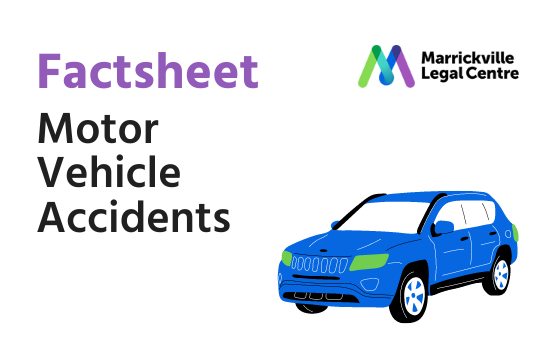This factsheet contains legal information about motor vehicle accidents for uninsured drivers who are not at fault. It is not legal advice. The legal information is current as at 24 February 2022.
Your rights & responsibilities in motor vehicle accidents as an uninsured driver
What do I do at the scene of a car accident?
- Write down information about the other car and driver: all drivers must stop and give their name, contact details, insurance details, licence and car registration numbers to the other driver.
- Get details from any witnesses.
- Take notes about the circumstances of the accident and any damage to property.
- Take a photograph or draw a diagram of the accident scene.
- Note the time of the accident, place, street lighting, traffic conditions, weather and anything else you think may have contributed to the crash.
- If police attend, they will speak to each driver and witnesses. Police should be called in some circumstances including if a person is injured or trapped.
It is helpful to take a photograph of both the front and back of other driver’s license to ensure you have their current address.
What if the other driver does not stop immediately following the accident?
You should try to take down the other driver’s vehicle registration number and report the accident to NSW Police within 24 hours of the accident.
The police can attend and investigate situations where an accident has occurred, and the other driver has failed to stop. The police can also investigate where the other driver has provided false details or attend when the other party has stopped but is refusing to provide details.
If the police will not or cannot provide the driver’s details but if you have the vehicle’s registration number, you can apply to Transport for NSW to find details of the vehicle’s ‘registered operator’.
How do I know who is at fault?
Generally, the person who was negligent and did not take reasonable care while driving is at fault.
It is not always easy to decide who is at fault; sometimes both drivers may be responsible. The best way to decide who is at fault at a later date is by taking notes of your version of events and collecting evidence including by getting witness statements and any relevant CCTV footage. You should then seek legal advice about your particular case.
If you own the car but somebody else is driving it, you may be responsible if the driver is your ‘agent’ and was at fault. You should not admit fault at the time of the accident as this might affect your case if you go to court.
Should I report the accident to the police?
You must report an accident to the police if:
- One or more of the drivers was intoxicated (under influence of drugs or alcohol)
- Someone was injured
- One or more of the cars had to be towed away from the scene
- The other driver did not stop to exchange details with you
If the police attend the scene, remember to get the police officer’s name and details and an ‘event number’ so you can request the Incident Report later if needed.
⚠️ Is the other driver insured?
Different outcomes will apply depending on the insurance status of the other party involved in the car, motorcycle or motor vehicle accident. Click below for specific legal information relevant to the insurance status of the other driver.

